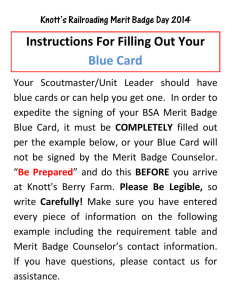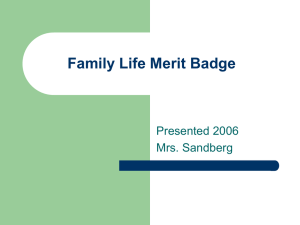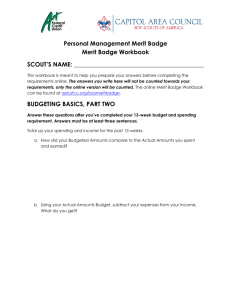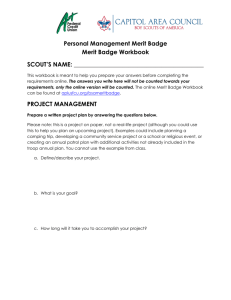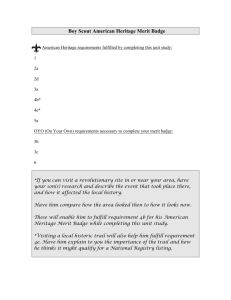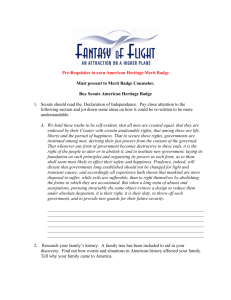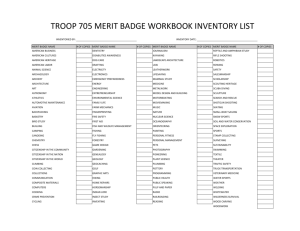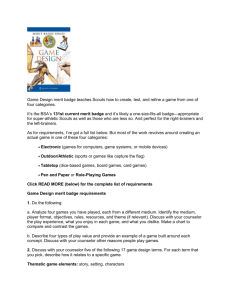Personal Management MB Requirements
advertisement
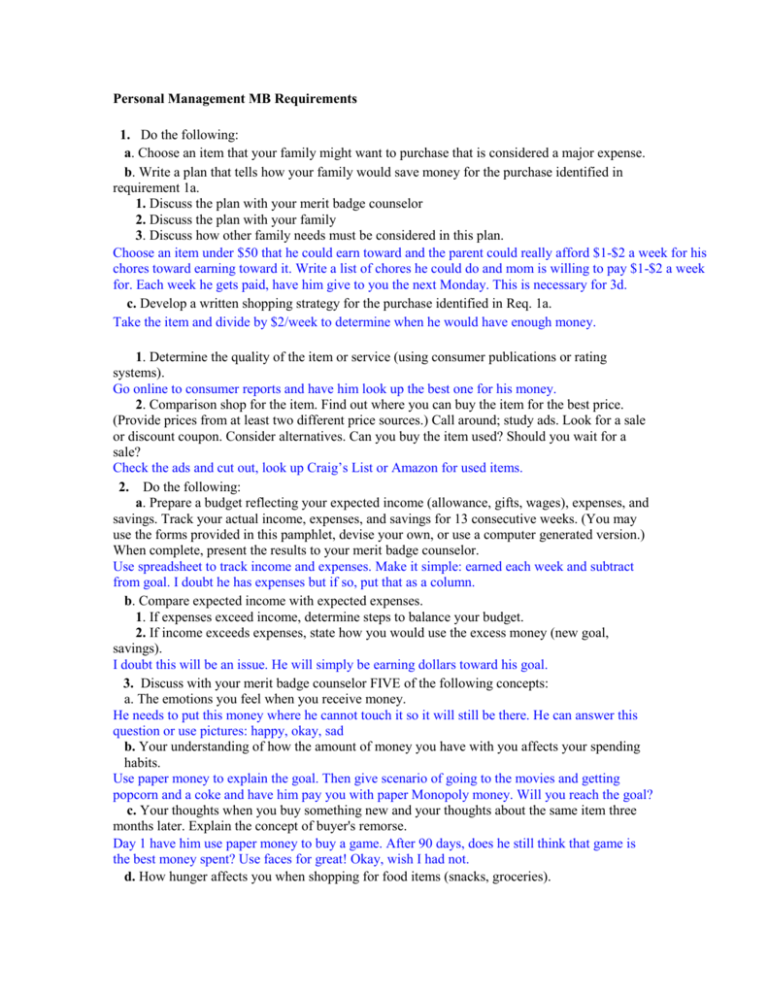
Personal Management MB Requirements 1. Do the following: a. Choose an item that your family might want to purchase that is considered a major expense. b. Write a plan that tells how your family would save money for the purchase identified in requirement 1a. 1. Discuss the plan with your merit badge counselor 2. Discuss the plan with your family 3. Discuss how other family needs must be considered in this plan. Choose an item under $50 that he could earn toward and the parent could really afford $1-$2 a week for his chores toward earning toward it. Write a list of chores he could do and mom is willing to pay $1-$2 a week for. Each week he gets paid, have him give to you the next Monday. This is necessary for 3d. c. Develop a written shopping strategy for the purchase identified in Req. 1a. Take the item and divide by $2/week to determine when he would have enough money. 1. Determine the quality of the item or service (using consumer publications or rating systems). Go online to consumer reports and have him look up the best one for his money. 2. Comparison shop for the item. Find out where you can buy the item for the best price. (Provide prices from at least two different price sources.) Call around; study ads. Look for a sale or discount coupon. Consider alternatives. Can you buy the item used? Should you wait for a sale? Check the ads and cut out, look up Craig’s List or Amazon for used items. 2. Do the following: a. Prepare a budget reflecting your expected income (allowance, gifts, wages), expenses, and savings. Track your actual income, expenses, and savings for 13 consecutive weeks. (You may use the forms provided in this pamphlet, devise your own, or use a computer generated version.) When complete, present the results to your merit badge counselor. Use spreadsheet to track income and expenses. Make it simple: earned each week and subtract from goal. I doubt he has expenses but if so, put that as a column. b. Compare expected income with expected expenses. 1. If expenses exceed income, determine steps to balance your budget. 2. If income exceeds expenses, state how you would use the excess money (new goal, savings). I doubt this will be an issue. He will simply be earning dollars toward his goal. 3. Discuss with your merit badge counselor FIVE of the following concepts: a. The emotions you feel when you receive money. He needs to put this money where he cannot touch it so it will still be there. He can answer this question or use pictures: happy, okay, sad b. Your understanding of how the amount of money you have with you affects your spending habits. Use paper money to explain the goal. Then give scenario of going to the movies and getting popcorn and a coke and have him pay you with paper Monopoly money. Will you reach the goal? c. Your thoughts when you buy something new and your thoughts about the same item three months later. Explain the concept of buyer's remorse. Day 1 have him use paper money to buy a game. After 90 days, does he still think that game is the best money spent? Use faces for great! Okay, wish I had not. d. How hunger affects you when shopping for food items (snacks, groceries). Have paper money in his hand to give every Monday. Have snacks available while you are talking and tell him they are $1 each. Is it hard to give the dollar to you and not buy a snack? e. Your experience of an item you have purchased after seeing or hearing advertisements for it. Did the item work as well as advertised? Show ads for big screen TVs. Ask him which one he thinks is the best. Was it due to ads or consumer articles. Look up online and see which one is recommended on consumer digest. f. Your understanding of what happens when you put money into a savings account. As he gives you the dollar each week, tell him that he also gets a dime each month for keeping the dollars saved. Show him the difference between money saved in his wallet and money saved in savings. g. Charitable giving. Explain its purpose and your thoughts about it. Talk about the clothing, coat and blanket drives they have at school. Talk about where they go and who benefits. How does that make him feel for helping someone they do not know? h. What you can do to better manage your money. When the project is over, what can you do to save now for the next item? Can you save half and spend half? Save for 2 different wishes? How? 4. Explain the following to your merit badge counselor: a. The differences between saving and investing, including reasons for using one over the other. b. The concepts of return on investment and risk. c. The concepts of simple interest and compound interest and how these affected the results of your investment exercise. 5. Select five publicly traded stocks from the business section of the newspaper. Explain to your merit badge counselor the importance of the following information for each stock: a. Current price b. How much the price changed from the previous day c. The 52-week high and the 52-week low prices 6. Pretend you have $1,000 to save, invest, and help prepare yourself for the future. Explain to your merit badge counselor the advantages or disadvantages of saving or investing in each of the following: a. Common stocks b. Mutual funds c. Life insurance d. A certificate of deposit (CD) e. A savings account or U.S. savings bond 7. Explain to your merit badge counselor the following: a. What a loan is, what interest is, and how the annual percentage rate (APR) measures the true cost of a loan. b. The different ways to borrow money. c. The differences between a charge card, debit card, and credit card. What are the costs and pitfalls of using these financial tools? Explain why it is unwise to make only the minimum payment on your credit card. d. Credit reports and how personal responsibility can affect your credit report. e. Ways to reduce or eliminate debt. 8. Demonstrate to your merit badge counselor your understanding of time management by doing the following: a. Write a "to do" list of tasks or activities, such as homework assignments, chores, and personal projects, that must be done in the coming week. List these in order of importance to you. b. Make a seven-day calendar or schedule. Put in your set activities, such as school classes, sports practices or games, jobs or chores, and/or Scout or church or club meetings, then plan when you will do all the tasks from your "to do" list between your set activities. c. Follow the one-week schedule you planned. Keep a daily diary or journal during each of the seven days of this week's activities, writing down when you completed each of the tasks on your "to do" list compared to when you scheduled them. d. Review your "to do" list, one-week schedule, and diary/journal to understand when your schedule worked and when it did not work. With your merit badge counselor, discuss and understand what you learned from this requirement and what you might do differently the next time. 9. Prepare a written project plan demonstrating the steps below, including the desired outcome. This is a project on paper, not a real-life project. Examples could include planning a camping trip, developing a community service project or a school or religious event, or creating an annual patrol plan with additional activities not already included in the troop annual plan. Discuss your completed project plan with your merit badge counselor. a. Define the project. What is your goal? b. Develop a timeline for your project that shows the steps you must take from beginning to completion. c. Describe your project. d. Develop a list of resources. Identify how these resources will help you achieve your goal. e. If necessary, develop a budget for your project. 10. Do the following: a. Choose a career you might want to enter after high school or college graduation. b. Research the limitations of your anticipated career and discuss with your merit badge counselor what you have learned about qualifications such as education, skills, and experience.
